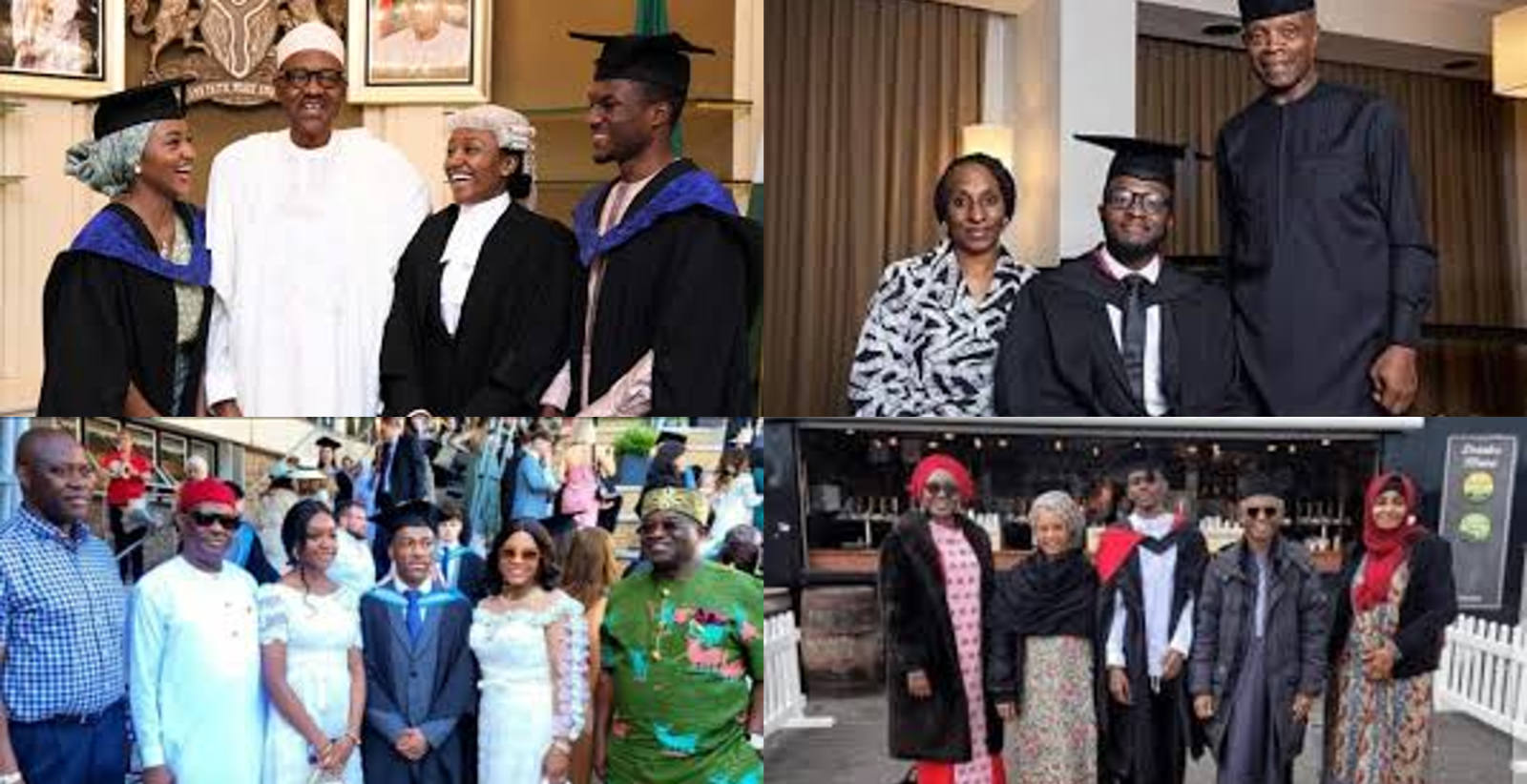
Vote for Me, I’ll Fix Nigerian Schools — But My Kids Will Never Use Them

In a nation where university strikes have become as routine as public holidays, and where dilapidated classrooms are the norm rather than the exception, Nigerian politicians continue to send a loud message:
This system is not good enough for my children.
From the gates of Harvard to the lawns of Cambridge, from Dubai’s elite international schools to Canadian boarding institutions, the children of Nigeria’s political elite are receiving an education far removed from the chaos back home. The spectacle of political privilege is often proudly broadcast across social media, where graduation photos of senators’ sons and governors’ daughters flood timelines, ironically during periods when strikes lock down public universities in Nigeria.
It begs the question:
If Nigerian public schools are as promising as the manifestos claim, why do those in power run from them?
When Leadership is Absent at Home, But Present Abroad
This phenomenon is not new, but it has become more glaring in recent years. Let’s examine a few that illustrate this political pattern.
- President Bola Tinubu
Tinubu’s son, Seyi Tinubu, is known to have studied abroad. The younger Tinubu has a Bachelor’s degree in law and a Master’s degree in corporate and commercial law from the University of Buckingham.. He has become a visible figure in Nigerian social and political circles, but his foundational education was far removed from Nigeria’s public institutions.
The past President, Muhammadu Buhari, as well as the Vice President, Yemi Osinbajo’s children, graduated from universities in the UK.
- Governors and Senators
Governor Nyesom Wike’s children have graduated from studying in the UK. Jordan Nyesom-Wike graduated from the University of Exeter, United Kingdom.
Mohammed Sani Badaru, the son of former Governor Badaru Abubakar, graduated from Brunel University London in the United Kingdom.
Mayo Daniel, the son of former governor Gbenga Daniel, graduated with a master’s degree from the University of London, England.
Former Governor Nasir El-Rufai’s son, Ahmad, graduated from an undisclosed university in the United Kingdom.
Former Governor Rochas Okorocha, a man who once took pride in building schools for the poor, has several of his children being schooled overseas.
Senator Dino Melaye famously posted videos of himself attending his child’s graduation abroad, while ASUU was on strike back home.
These are not isolated cases. They are part of a widespread culture among political elites that insulates their families from the corruption they help maintain.
A Culture of Escape, Not Reform
Nigerian universities, particularly public ones, are consistently underfunded, mismanaged, and plagued by political interference. The Academic Staff Union of Universities (ASUU) has become more associated with industrial actions than academic progress. Since 1999, ASUU has embarked on over 16 major strike actions, halting academic calendars and jeopardising the futures of millions of Nigerian students.
Meanwhile, politicians comfortably withdraw millions in foreign currencies to pay tuition, rent apartments, and fly first-class to attend their children’s graduations.
This isn’t just a preference for quality education; it’s an indictment of failure and abandonment.
Motivations and Implications
Many people believe that the reasons for this trend are multifaceted. Key among them are the poor state of Nigerian tertiary education and the desire for quality and uninterrupted academic experiences abroad.
Nigerian public education has become unreliable. Parents who can afford alternatives, especially those in power, will naturally seek them out. But when public officials avoid their institutions, it reflects a deeper systemic failure.
The implications of this trend is far-reaching. Many argue that it indicates a disconnect between the ruling class and the average citizen, reflecting a lack of faith in the very institutions that politicians are elected to improve.
This is not just a personal choice, it is a public concern. When public funds are used to maintain elite lifestyles while the masses suffer, it raises questions about accountability and social equity.
Strikes, Funding Gaps, and Student Frustration
Public universities in Nigeria have faced severe underfunding and academic disruptions. The most recent ASUU strike, which occurred in 2022, lasted eight months, leaving over one million students stranded.
According to a 2023 report by the National Bureau of Statistics (NBS), Nigeria allocates less than 7 per cent of its annual budget to education, which is far below the UNESCO-recommended benchmark of 15–20 per cent.
In contrast, Nigerian families reportedly spend over $2 billion annually on foreign education, according to data from the Central Bank of Nigeria (CBN). A significant portion of this spending is attributed to political officeholders and wealthy elites.
The implications extend beyond education. Here’s what this trend reveals:
Hypocrisy and Mistrust
How can leaders who don’t trust public institutions expect the public to do so? It’s hypocritical to campaign and promises to fix education while enrolling one’s own children in systems untouched by Nigeria’s dysfunction.
Social Inequality
This elite migration of education perpetuates deepening class divisions. While the poor are stuck in unstable academic calendars, the children of the rich are building powerful networks and accumulating global advantages.
Brain Drain
Many foreign-trained children of Nigerian politicians do not return. They build careers abroad, start businesses overseas, and participate in global economies, leaving behind a nation that invested nothing in them and receives nothing in return.
There are no easy fixes, but some measures can help:
Policy and Accountability
Should there be a policy requiring public officials to educate their children locally while in office? Some countries, such as Rwanda, have experimented with variations of this approach to keep elites invested in local systems.
Invest in Education Like It Matters
The Nigerian government continues to allocate far below UNESCO’s recommended quota of the national budget to education. Until political will matches public rhetoric, nothing will change.
Public Pressure
Nigerians must stop applauding this behaviour. Lavish foreign graduations should not be celebrated in a country where education is in crisis.
The future of a nation is built in its classrooms, not in the elite boarding schools of London or the Ivy Leagues of America. When Nigerian leaders prioritise foreign degrees over domestic reform, they’re not just fleeing a broken system. They’re actively participating in its collapse.
Until Nigerian politicians are willing to sit their children in the very classrooms they’ve created for the masses, their promises of reforms will remain empty rhetoric.
Read More:
- In Africa, Steal a Phone and Die — Steal Billions, Gain Power
- ‘Tinubu’ Now Christened on Airports, Barracks, and Possibly Mass Graves
About The Author
Related Articles
Asake Sets New Billboard Afrobeats Record as Chart Presence Grows
Asake has further cemented his place as one of Afrobeats’ most dominant...
ByWest Africa WeeklyJanuary 29, 2026Nigerians Lament PayPal’s Return as Old Wounds Resurface
PayPal’s reentry into Nigeria through a partnership with local fintech company Paga...
ByWest Africa WeeklyJanuary 29, 2026Tanzania Eyes Gold Sales as Aid Declines and Infrastructure Needs Grow
Tanzania is weighing plans to sell part of its gold reserves to...
ByWest Africa WeeklyJanuary 29, 2026Mali Tightens Grip on Explosives Supply With New Majority Stake
The Malian government has taken majority ownership of a civil explosives manufacturing...
ByWest Africa WeeklyJanuary 29, 2026












Leave a comment